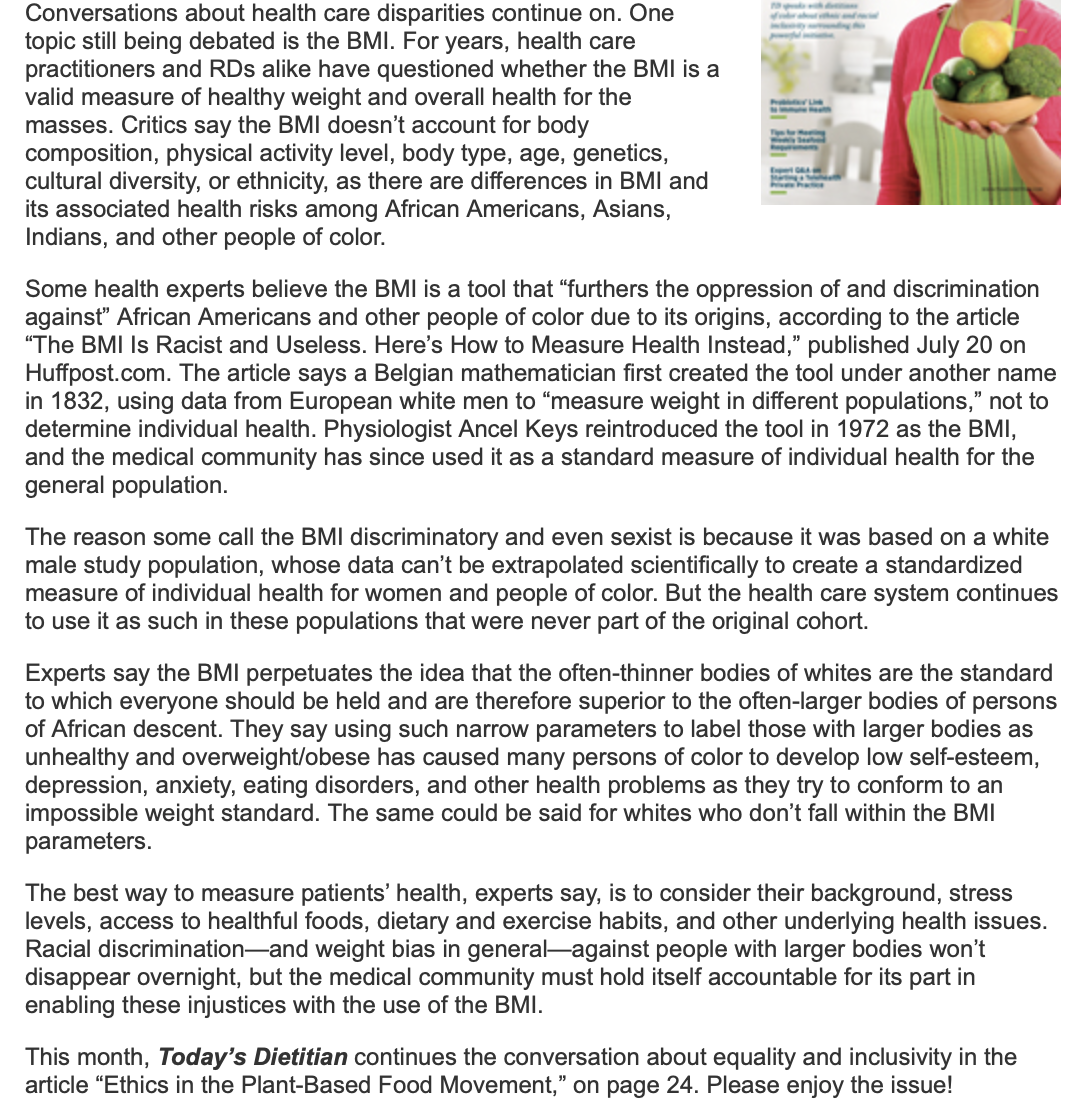Answer all questions in 3-4 paragraphs and IN YOUR OWN WORDS: Read the following article below regarding BMI. 1) Describe the Body Mass Index and how it is used as an assessment tool. 2) From the article, describe how some people feel the BMI contributes to racial discrimination in the medical fields.
Answer all questions in 3-4 paragraphs and IN YOUR OWN WORDS: Read the following article below regarding BMI. 1) Describe the Body Mass Index and how it is used as an assessment tool. 2) From the article, describe how some people feel the BMI contributes to racial discrimination in the medical fields.
Nutrition: Concepts and Controversies - Standalone book (MindTap Course List)
14th Edition
ISBN:9781305627994
Author:Frances Sizer, Ellie Whitney
Publisher:Frances Sizer, Ellie Whitney
Chapter4: The Carbohydrates: Sugar, Starch, Glycogen, And Fiber
Section: Chapter Questions
Problem 1CT
Related questions
Question
Answer all questions in 3-4 paragraphs and IN YOUR OWN WORDS:
Read the following article below regarding BMI. 1) Describe the Body Mass Index and how it is used as an assessment tool. 2) From the article, describe how some people feel the BMI contributes to racial discrimination in the medical fields.

Transcribed Image Text:Conversations about health care disparities continue on. One
topic still being debated is the BMI. For years, health care
practitioners and RDs alike have questioned whether the BMI is a
valid measure of healthy weight and overall health for the
masses. Critics say the BMI doesn't account for body
composition, physical activity level, body type, age, genetics,
cultural diversity, or ethnicity, as there are differences in BMI and
its associated health risks among African Americans, Asians,
Indians, and other people of color.
Enpert GA
Some health experts believe the BMI is a tool that "furthers the oppression of and discrimination
against" African Americans and other people of color due to its origins, according to the article
"The BMI Is Racist and Useless. Here's How to Measure Health Instead," published July 20 on
Huffpost.com. The article says a Belgian mathematician first created the tool under another name
in 1832, using data from European white men to "measure weight in different populations," not to
determine individual health. Physiologist Ancel Keys reintroduced the tool in 1972 as the BMI,
and the medical community has since used it as a standard measure of individual health for the
general population.
The reason some call the BMI discriminatory and even sexist is because it was based on a white
male study population, whose data can't be extrapolated scientifically to create a standardized
measure of individual health for women and people of color. But the health care system continues
to use it as such in these populations that were never part of the original cohort.
Experts say the BMI perpetuates the idea that the often-thinner bodies of whites are the standard
to which everyone should be held and are therefore superior to the often-larger bodies of persons
of African descent. They say using such narrow parameters to label those with larger bodies as
unhealthy and overweight/obese has caused many persons of color to develop low self-esteem,
depression, anxiety, eating disorders, and other health problems as they try to conform to an
impossible weight standard. The same could be said for whites who don't fall within the BMI
parameters.
The best way to measure patients' health, experts say, is to consider their background, stress
levels, access to healthful foods, dietary and exercise habits, and other underlying health issues.
Racial discrimination-and weight bias in general-against people with larger bodies won't
disappear overnight, but the medical community must hold itself accountable for its part in
enabling these injustices with the use of the BMI.
This month, Today's Dietitian continues the conversation about equality and inclusivity in the
article "Ethics in the Plant-Based Food Movement," on page 24. Please enjoy the issue!
Expert Solution
This question has been solved!
Explore an expertly crafted, step-by-step solution for a thorough understanding of key concepts.
Step by step
Solved in 2 steps

Recommended textbooks for you

Nutrition: Concepts and Controversies - Standalo…
Health & Nutrition
ISBN:
9781305627994
Author:
Frances Sizer, Ellie Whitney
Publisher:
Brooks Cole

Nutrition Through The Life Cycle
Health & Nutrition
ISBN:
9781337919333
Author:
Brown, Judith E.
Publisher:
Cengage Learning,

Essentials Health Info Management Principles/Prac…
Health & Nutrition
ISBN:
9780357191651
Author:
Bowie
Publisher:
Cengage

Nutrition: Concepts and Controversies - Standalo…
Health & Nutrition
ISBN:
9781305627994
Author:
Frances Sizer, Ellie Whitney
Publisher:
Brooks Cole

Nutrition Through The Life Cycle
Health & Nutrition
ISBN:
9781337919333
Author:
Brown, Judith E.
Publisher:
Cengage Learning,

Essentials Health Info Management Principles/Prac…
Health & Nutrition
ISBN:
9780357191651
Author:
Bowie
Publisher:
Cengage

Lifetime Physical Fitness & Wellness
Health & Nutrition
ISBN:
9781337677509
Author:
HOEGER
Publisher:
Cengage

